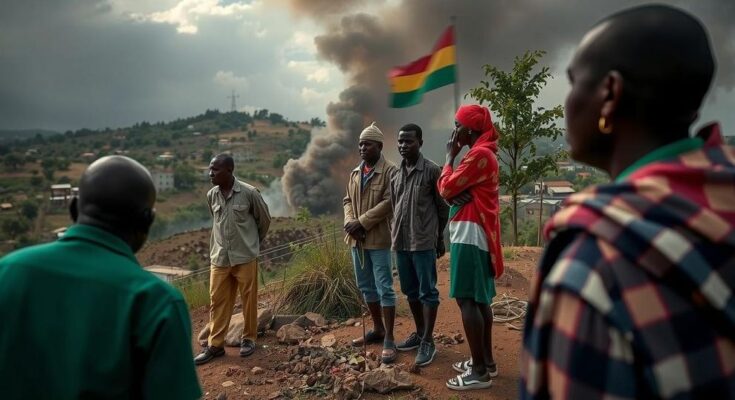Russia has vetoed a UK-backed UN resolution calling for a ceasefire in Sudan, sparking outrage from the UK and US officials. The veto undermines efforts to address the severe humanitarian crisis resulting from the ongoing civil war, which has claimed countless lives and displaced millions. Despite support from 14 other Security Council members, the resolution failed to pass, highlighting ongoing geopolitical tensions in the region.
The United Nations Security Council faced a contentious session when Russia exercised its veto against a UK-proposed resolution aimed at establishing a ceasefire in Sudan. This resolution, backed by Sierra Leone, was intended to address the escalating humanitarian crisis stemming from Sudan’s civil war, which has resulted in tens of thousands of deaths and over 11 million displaced individuals. British Foreign Secretary David Lammy condemned the veto as a “disgrace,” highlighting the urgent need for humanitarian intervention as civilians continue to suffer amid the conflict. Conversely, Russian representatives contended that the resolution undermined Sudanese sovereignty and accused the UK of interference. The civil war in Sudan began in April 2023 between the national army and the Rapid Support Forces (RSF), initiating a brutal power struggle. Aid workers have expressed concerns that this conflict has precipitated the most severe humanitarian crisis globally, with many facing starvation. The draft resolution specifically addressed the need for an immediate cessation of hostilities and urged the warring factions to engage in peace talks, emphasizing the need to protect civilians according to previously established agreements. Despite the support of 14 other Security Council members, the Russian veto prevented the enactment of the resolution, prompting strong reactions from Western representatives. The US ambassador to the UN, Linda Thomas-Greenfield, accused Russia of obstructing efforts to alleviate the dire circumstances in Sudan, alleging that Russia sought to promote its political agenda at the cost of Sudanese lives. The Sudanese ambassador indicated dissatisfaction with the resolution, particularly its exclusion of clauses condemning external support for the RSF and the designation of the RSF as terrorists due to their actions against civilians. As tensions continue, the international community grapples with the complex dynamics of the conflict and the ongoing humanitarian repercussions.
The war in Sudan has devolved into a prolonged conflict since April 2023, sparked by a competition for power between the Sudanese army and the Rapid Support Forces (RSF), a powerful military group. This civil war has led to catastrophic humanitarian consequences, which aid organizations describe as the worst crisis globally. Approximately 11 million people have been displaced, and many are facing famine. The ongoing violence has not only caused immense suffering but has also raised serious concerns about human rights violations, including potential war crimes committed by both the army and the RSF. The political landscape surrounding the conflict involves various international actors, including the UN Security Council, which has been engaged in discussions regarding attempts to foster a resolution amidst the crisis.
The veto by Russia against the proposed ceasefire resolution underscores the complexities of international diplomacy in the face of severe humanitarian crises. British and American officials expressed outrage at the decision, framing it as an affront to the suffering of the Sudanese people. The ongoing civil war continues to devastate the nation, highlighting the pressing need for a concerted global response that respects both Sudanese sovereignty and the urgent humanitarian needs of its populace. The future of the conflict remains uncertain as external geopolitical interests intersect with the plight of millions affected by the war.
Original Source: www.bbc.co.uk




